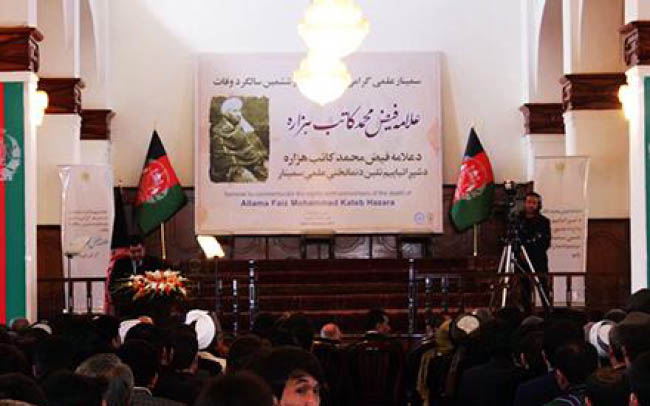KABUL - Speaking at the ceremony of remembering the 86th death anniversary of Faiz Mohammad Katib, an Afghan historian, President Ashraf Ghani said Katib was the founding father of Afghanistan’s modern history and one of the hard working historians in the country.
He said Katib’s Siraj-ul-Tawarikh is one of the most credible books of the country’s history.
The book will define the Afghan history to the next generations of the country clearly and in an explicit manner, Ghani added.
“When we compare the masterpiece of Faiz Mohammad Katib with other people before him and the people after him who wrote the history and analyzed his outstanding job, we come to a conclusion that it is worth to call him the father of historians in Afghanistan. His writings will benefit the next generations either,” he stated.
Ghani authorized certain institutions to design a new medal under the name of Faiz Mohammad Katib.
“I direct that a memorial monument should be built at tomb of Allamah Katib. Second, the Ministry of Justice should take necessary steps to create a medal of honor after Allahma Faiz Mohammad Kateb and refer it to the cabinet for approval in order to honor the services of this great personality from the viewpoint of the nation and the government,” Ghani added.
Faiz Mohammad Katib was serving as Afghan court chronicler and secretary to the Amir Abdul Rahman Khan and then his son Amir Habibullah Khan. His job was to write government’s official letters and order.
“Katib besides being a court chronicler was a brave and a skilled intellectual. He never sacrificed the truth for the sake of the expediency of interest and always preferred the interests of the nation to the personal internets,” Second Vice Presidnet Mohammad Sarwar Danish said.
“When modern schools were established in Afghanistan, he wrote a book known as Aman-ul-Insha which was teaching students about methodology of correct writing,” said writer Sarwar Maulayee.
“He had a deep sense of nationalism. His was that the plight of oppressed people should not be forgotten in the history,” said writer Habibullah Rafi.
Katib was borin in 1862 in Zard Sang village of Qarabagh district of Ghazni province of Afghanistan. He spent a part of his life in Nahoor, another district of Ghazni and died in Kabul in March 3, 1931.
He was an ethnic and was of Mohammad Khuwaja clan. He was Afghan court chronicler, a skilled calligrapher and secretary to Emir Habib Ullah Khan from 1901 to 1919.
Katib pursued education in Iraq’s holy city of Najaf, India, Lahore and Peshawar.
Besides the monumental Siraj al-Tawrikh, Faiz Mohammad wrote the following works:
• Tuhfatul Habib' Afghan History (1747–1880), in two volumes.
• Tazkeratul Enqilaab accounts of the days of Habibullah, Bacha-e Saqaw
• History of Ancient Prophets/Rulers, from Adam to Jesus
• Hidāyat-i kisht-i gul-ha wa qalamah-hā va ḥubūbāt va ghayrah (1921–1922)
• Jughrāfiyā-yi ṭabʻī va Afrīqā
• Tarikh-e Hokama-ye Motaqaddem, compiled while he was working at the Ministry of Education;
• Fayz al-Foyuzat, a fragment of which, called Afghan treaties and agreements (ʿahd wa misaq-e afghan) was published in Sayyed Mahdi Farrokh’s Tarikh-e Siasi-ye Afghanistan (Tehran, 1314 S./1935) and which, in tune with the times, was a sharp critique of the Abdul Rahman’s relations with the British;
• Faqarat-e Sharʿiya, which is not known to have survived;
• Nasab-nama-ye Tawaʾef-e afghena wa taʿaddod-e nofus-e ishan, also known as Nijhad-nama-ye Afghan, a description of Afghan tribes and non-Afghans residing in Afghanistan. The Nijhad-nama was published in Persia in 1933 from a manuscript thought to be the autograph and held in the Kitab Khana-ye Milli-ye Malik in Tehran. (Tolonews)
Home » Afghanistan » Ghani Calls Katib Father of Afghanistan’s Modern History
Ghani Calls Katib Father of Afghanistan’s Modern History

